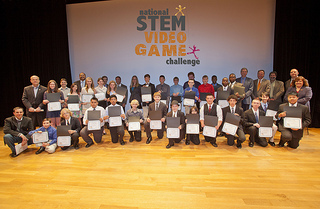This op-ed was originally published in the Boston Globe’s “The Podium” on September 25, 2011.
For decades, America’s educational leadership has been the envy of the world. But now, in the face of globalization and economic realignment, adaptation and innovation are urgently needed.
Retooling our education engine to produce better outcomes will drive our ability to compete in a complex, networked world powered by technology and efficiency. Transitioning to the digital age will define our children’s future career prospects in the knowledge-based economy of 21st century.
That transition is well underway, as evidenced by the growing ubiquity of new technologies, like digital games, once confined to home and peer play, that are appearing in curricula, from kindergartens to college courses.
Today’s digital games industry is best known as a $55 billion worldwide video game entertainment behemoth that conjures images of mayhem and adolescent bonding. But digital games have emerged as much more than that. Driven by their highly visual and engaging nature, games are now found everywhere from medical and military simulations, to publishing and advertising, to corporate training and healthcare.
Foundational literacy skills such as reading, united with new digital literacy skills that evolve from interactive play, must now drive educational change. According to industry marketing reports, some 50 million kids between the ages of 5-17 regularly play games, and the reach of games has gone beyond the stereotypical male tech geek.
The Entertainment Software Association reports that 72 percent of households play games on tablets, smartphones, laptops, consoles and other devices. Furthermore, 50 percent of parents play digital games with their kids, 84 percent of parents think the games are “fun for the entire family,” and 66 percent think games “provide mental stimulation.
This past spring, President Obama visited Tech Boston Academy in Dorchester, and called for “investments in educational technology that will help create digital tutors that are as effective as personal tutors, educational software as compelling as the best video game.”
A growing number of promising initiatives are doing just that. The National STEM Video Game Challenge, developed by The Joan Ganz Cooney Center and E-Line Media, encourages youth, graduate students and professional developers to create their own game-based solutions to teach essential knowledge and skills. Effective new applications and games have emerged as a result, including the game “Prankster Planet,” created for Sesame Workshop’s The Electric Company.
Building upon the insights of creative designers paired with child development experts, entire schools have been founded on the concept of game-based learning. Quest to Learn, in New York City, is the country’s first public school grounded in principles of game design. A second, Chicago Quest will open this September.
The premise behind these schools is simple: let young people, via game design principles, build their own learning environments, which then will teach them how to develop the skills needed to thrive and compete in the global economy.
The Commonwealth is home to a healthy digital games cluster, and companies like Muzzy Lane Software are leading the way in creating fun game-based learning products. Their well-known “Making History” series allows players to immerse themselves in World War II. “Past/Present“, funded by the Corporation for Public Broadcasting, has players experience life in a mill city during the industrial revolution.
Area universities and non-profits are hard at it as well. The Concord Consortium, a nonprofit dedicated to igniting large-scale improvements in teaching and learning through technology, produced the Science Prize for Online Resources in Education award-winning “Molecular Workbench” with support from the National Science Foundation. The Education Arcade at MIT explores games that promote learning through authentic and engaging play, like “Caduceus,” a game kids can play at Generation Cures for Children’s Hospital Boston.
Last April, the Patrick administration created the Massachusetts Digital Games Institute, based at Becker College in Worcester. The institute’s mission is to prompt even greater collaboration among the digital games industry, the public sector and academia to strategically foster job growth and economic development in the Commonwealth.
Digital game technologies offer enormous potential to help unleash untapped skills, knowledge and perspectives needed for our future leaders to compete and cooperate in a flat world economy. There is no doubt that America has the people, resources, and ideas to level up: it just needs to get in the game!
Michael H. Levine is executive director of the Joan Ganz Cooney Center at Sesame Workshop in New York, Timothy Loew is executive director of the Massachusetts Digital Games Institute in Worcester.




